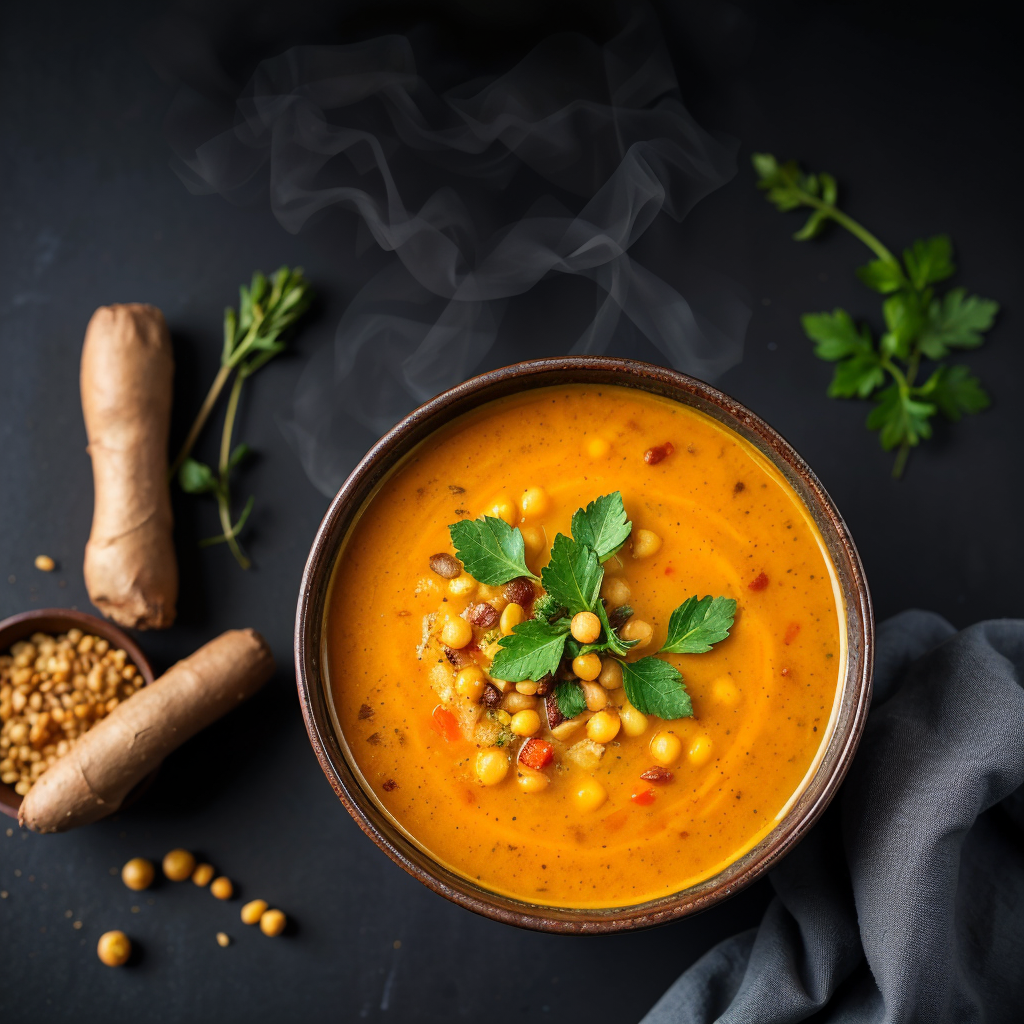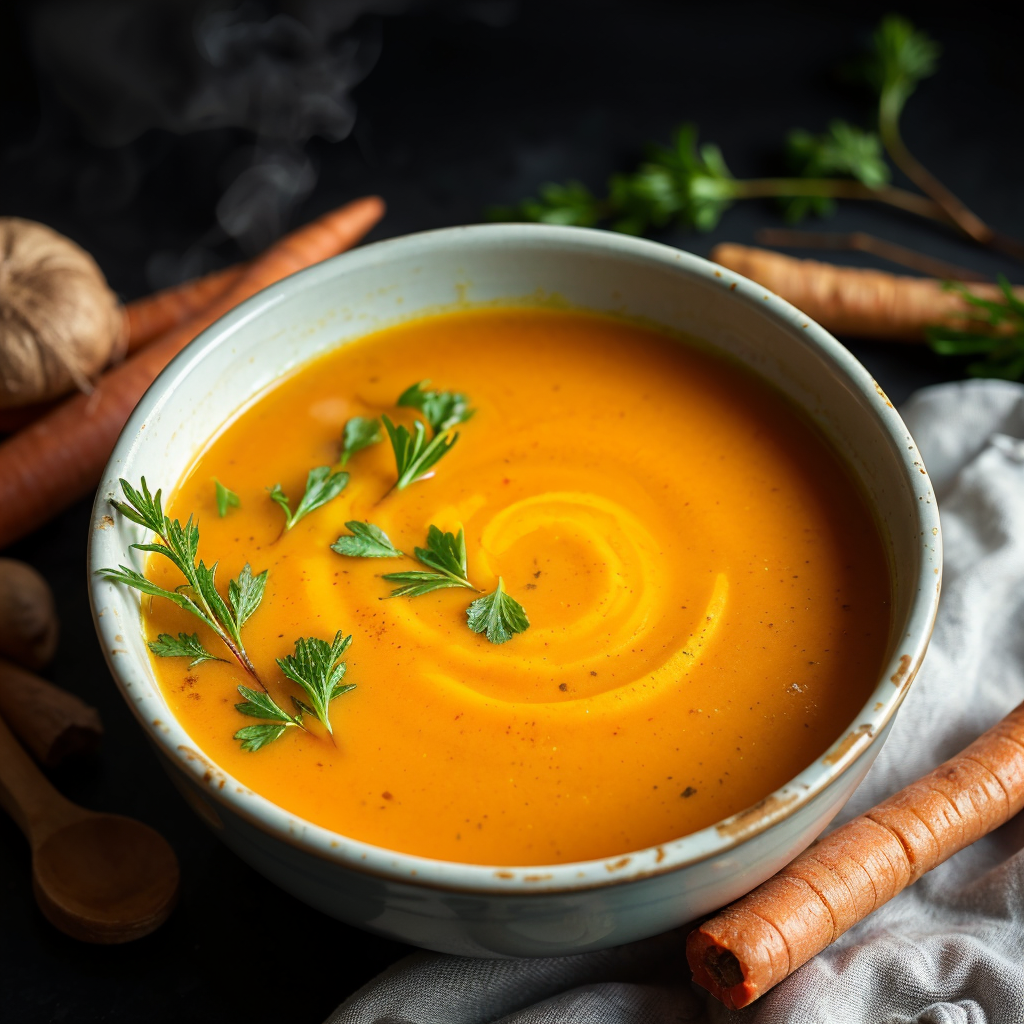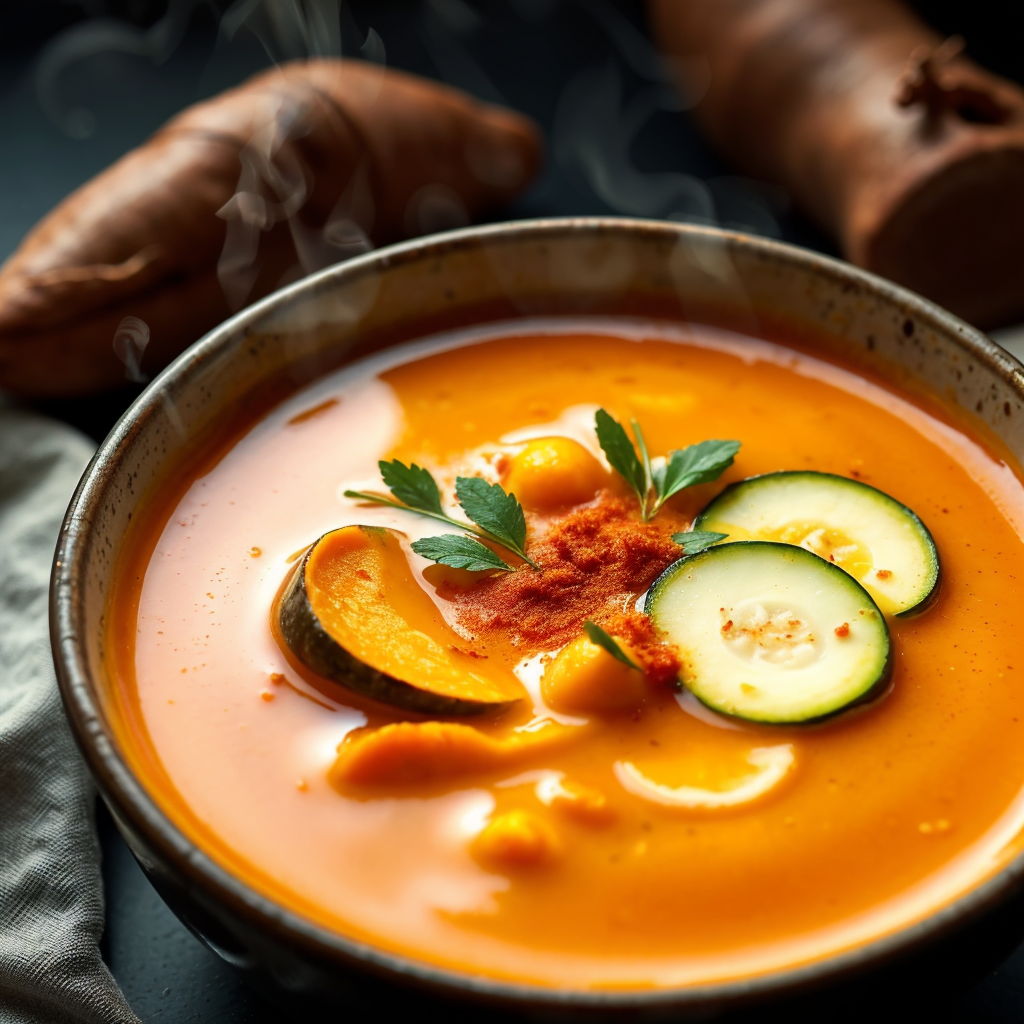5 Delicious Anti-Inflammatory Soup for Optimal Health
Staying healthy is essential, especially in today’s busy world. One crucial factor that affects our well-being is inflammation. Chronic inflammation can lead to health problems like heart disease, diabetes, and arthritis. Incorporating anti-inflammatory foods into your diet can help reduce these risks.

Soups are a fantastic way to enjoy these healthy foods. They are comforting, nutritious, and easy to make. In this blog, we’ll explore the benefits of anti-inflammatory soups and share some tasty recipes to boost your health and wellness.
What Makes a Soup Anti-Inflammatory?
Key Ingredients
Anti-inflammatory soups use ingredients known for reducing inflammation. Here are some common ones:
- Turmeric: It contains curcumin, a powerful anti-inflammatory compound.
- Ginger: Offers anti-inflammatory and antioxidant benefits.
- Garlic: Boosts the immune system and helps fight inflammation.
- Leafy Greens (like spinach): Packed with vitamins and antioxidants.
- Legumes (such as lentils): High in fiber and protein.
- Healthy Fats (like coconut milk): Provide anti-inflammatory fatty acids.
Cooking Methods
How you cook your soup can impact its anti-inflammatory benefits:
- Sautéing vs. Boiling: Sauté vegetables with spices like turmeric and ginger to release their beneficial compounds. Avoid boiling for too long, as it can reduce their potency.
- Blending: Blending soups can make nutrients more available for your body to absorb.
- Minimal Processing: Don’t overcook to preserve the integrity of anti-inflammatory ingredients.
The Science Behind Anti Inflammatory Soups
Research on Specific Ingredients and Their Effects
Anti-inflammatory soups are packed with ingredients backed by science for their health benefits:
- Turmeric (Curcumin): Known for its potent anti-inflammatory and antioxidant properties, curcumin helps reduce inflammatory markers in the body.
- Ginger: Contains gingerol, which has been shown to alleviate muscle pain and reduce inflammation.
- Garlic: Rich in allicin, garlic supports immune function and fights inflammation.
- Leafy Greens (Spinach): High in vitamins and antioxidants that combat oxidative stress and inflammation.
- Legumes (Lentils): Provide fiber and protein that support gut health and help regulate inflammation.
- Healthy Fats (Coconut Milk): Contains medium-chain triglycerides (MCTs) that can lower inflammation markers.
How Cooking Methods Affect Nutrient Retention
Proper cooking techniques are crucial for maintaining the nutritional value of your soups:
- Sautéing: Gently cooking spices and vegetables helps release their beneficial compounds without degrading them.
- Blending: Enhances nutrient absorption by breaking down cell walls, making vitamins and minerals more accessible.
- Minimal Boiling: Keeps heat-sensitive nutrients intact by avoiding prolonged cooking times.
- Roasting: Enhances flavors and retains fat-soluble vitamins when combined with healthy fats.
- Using Fresh Ingredients: Preserves essential oils and active compounds, maximizing health benefits.
By understanding the science behind your ingredients and cooking methods, you can create delicious soups that not only taste great but also support your health by reducing inflammation.
Top 5 Anti-Inflammatory Soup Recipes
1. Turmeric & Lentil Anti-Inflammatory Soup

Ingredients:
- 1 cup red lentils
- 1 teaspoon turmeric powder
- 1-inch piece fresh ginger, grated
- 3 cloves garlic, minced
- 2 carrots, diced
- 4 cups vegetable stock
- 1/2 cup coconut cream
Instructions:
- Sauté garlic, ginger, and carrots in a large pot until softened.
- Add red lentils, turmeric, and vegetable stock.
- Bring to a boil, then reduce heat and simmer for 20 minutes.
- Blend the soup until smooth using an immersion blender.
- Stir in coconut cream and heat through before serving.
Health Benefits: Loaded with antioxidants and anti-inflammatory compounds from turmeric and ginger, this soup supports overall health and reduces inflammation.
Nutritional Information (Per Serving):
| Nutritional Information (Per Serving) | Value |
|---|---|
| Calories | 250 kcal |
| Protein | 10g |
| Carbohydrates | 35g |
| Fat | 8g |
| Fiber | 12g |
| Vitamin A | 50% DV |
| Iron | 15% DV |
2. Ginger & Turmeric Carrot Soup

Ingredients:
- 4 large carrots, chopped
- 2 cups butternut squash, diced
- 1 tablespoon fresh ginger, grated
- 2 cloves garlic, minced
- 1 fennel bulb, sliced
- 4 cups vegetable broth
- 1 cup coconut milk
Instructions:
- Sauté garlic, ginger, and fennel in a pot until fragrant.
- Add carrots and butternut squash, cooking for a few minutes.
- Pour in vegetable broth and bring to a boil.
- Reduce heat and simmer until vegetables are tender.
- Blend the soup until creamy and stir in coconut milk before serving.
Health Benefits: Rich in beta-carotene and anti-inflammatory spices, this soup boosts your immune system and helps reduce inflammation.
RELATED: Anti-Inflammatory Snack Recipes
Nutritional Information (Per Serving):
| Nutritional Information (Per Serving) | Value |
|---|---|
| Calories | 300 kcal |
| Protein | 5g |
| Carbohydrates | 45g |
| Fat | 12g |
| Fiber | 10g |
| Vitamin A | 150% DV |
| Vitamin C | 30% DV |
3. Sweet Curry Anti-Inflammatory Soup

Ingredients:
- 2 large sweet potatoes, peeled and cubed
- 2 tablespoons curry powder
- 1 can of coconut milk
- 1 zucchini, sliced
- 3 cloves garlic, minced
- 1 onion, chopped
- 4 cups vegetable broth
Instructions:
- Sauté onions and garlic in a large pot until translucent.
- Add curry powder and stir for a minute to release flavors.
- Add sweet potatoes, zucchini, and vegetable broth.
- Bring to a boil, then simmer until vegetables are tender.
- Blend to your desired consistency—chunky or smooth.
Health Benefits: Combines the anti-inflammatory benefits of curry spices with nutrient-rich vegetables for a flavorful and healthy meal.
Nutritional Information (Per Serving):
| Nutritional Information (Per Serving) | Value |
|---|---|
| Calories | 280 kcal |
| Protein | 6g |
| Carbohydrates | 40g |
| Fat | 11g |
| Fiber | 9g |
| Vitamin A | 120% DV |
| Potassium | 15% DV |
RELATED: Top 10 Easy To Make Anti-Inflammatory Breakfasts Ideas
4. Thai Pumpkin Soup

Ingredients:
- 2 cups pumpkin, roasted and cubed
- 1 can of coconut milk
- 2 stalks lemongrass, bruised
- 1-inch piece ginger, sliced
- 1 teaspoon turmeric
- 4 kaffir lime leaves
- 4 cups vegetable stock
Instructions:
- Roast pumpkin until tender.
- Sauté lemongrass, ginger, turmeric, and kaffir lime leaves in a pot.
- Add roasted pumpkin and vegetable stock, bringing to a boil.
- Simmer for 15 minutes, then remove lemongrass and lime leaves.
- Blend the soup until smooth and stir in coconut milk before serving.
Health Benefits: Combines traditional Thai flavors with anti-inflammatory ingredients, offering a warming and healthful meal.
Nutritional Information (Per Serving):
| Nutritional Information (Per Serving) | Value |
|---|---|
| Calories | 320 kcal |
| Protein | 4g |
| Carbohydrates | 38g |
| Fat | 18g |
| Fiber | 7g |
| Vitamin A | 200% DV |
| Calcium | 10% DV |
5. Anti-Inflammatory Veggie Soup

Ingredients:
- 2 carrots, diced
- 2 celery stalks, sliced
- 1 cup red lentils
- 2 cups spinach, chopped
- 1 teaspoon turmeric
- 4 cups vegetable broth
- 2 cloves garlic, minced
- 1 onion, chopped
Instructions:
- Sauté onions and garlic in a large pot until fragrant.
- Add carrots, celery, and turmeric, cooking for a few minutes.
- Add red lentils and vegetable broth, bringing to a boil.
- Reduce heat and simmer until lentils and vegetables are tender.
- Stir in spinach and cook until wilted before serving.
Health Benefits: A hearty and versatile option, this soup is easy to customize for various dietary needs while providing essential nutrients and anti-inflammatory benefits.
Nutritional Information (Per Serving):
| Nutritional Information (Per Serving) | Value |
|---|---|
| Calories | 220 kcal |
| Protein | 12g |
| Carbohydrates | 35g |
| Fat | 5g |
| Fiber | 11g |
| Iron | 20% DV |
| Vitamin K | 25% DV |
Understanding these scientific principles ensures your soups are both delicious and health-promoting.
Tips for Making the Best Anti-Inflammatory Soups
Ingredient Substitutions
You can easily swap ingredients based on what you have or your dietary needs:
- Lentils: Use beans like chickpeas or black beans instead.
- Coconut Milk: Try almond milk or cashew cream for a different flavor.
- Vegetable Stock: Make your own to control sodium levels.
RELATED: 5 Delicious Anti-Inflammatory Bread Recipes
Cooking Techniques
Preserve the nutrients in your ingredients with these tips:
- Sautéing: Cook spices and vegetables gently to release flavors without burning.
- Blending: Use an immersion blender for a smooth texture while keeping nutrients intact.
- Minimal Boiling: Avoid overcooking to maintain the potency of anti-inflammatory compounds.
Enhancing Flavor
Boost your soup’s taste naturally:
- Herbs and Spices: Add fresh herbs like cilantro or parsley, and spices such as cumin and paprika.
- Acidity: A splash of lemon juice or apple cider vinegar can brighten flavors.
- Umami: Ingredients like mushrooms or nutritional yeast add depth without extra salt.
Meal Prep and Storage Tips
How to Batch Cook Soups for the Week
- Plan Ahead: Choose a day to make large batches of soup to save time during the week.
- Portion Control: Divide soups into individual servings using airtight containers for easy meals.
- Freezing: Most soups freeze well. Use freezer-safe containers and leave space for expansion.
Best Storage Practices
Keep your soups fresh and flavorful:
- Refrigeration: Store soups in the fridge for up to five days.
- Freezing: Label containers with dates and freeze for up to three months.
- Reheating: Reheat soups on the stove or in the microwave. Add a splash of water or broth if needed to restore consistency.
Anti-inflammatory soups are not only delicious but also a powerful addition to a healthy diet. By using nutrient-rich ingredients and mindful cooking techniques, you can create comforting meals that support your wellness goals. Try out these recipes, experiment with different flavors, and enjoy the health benefits of anti-inflammatory soups.
FAQs About Anti-Inflammatory Soups
What are the main benefits of anti-inflammatory soups?
Anti-inflammatory soups help reduce chronic inflammation, support immune function, and provide essential nutrients that promote overall health.
Can I make anti-inflammatory soups if I have dietary restrictions?
Absolutely! Anti-inflammatory soups are versatile and can be adapted to accommodate various dietary needs, such as vegan, gluten-free, or dairy-free options.
How often should I include anti-inflammatory soups in my diet?
Including anti-inflammatory soups several times a week can significantly contribute to reducing inflammation and improving health.
Can anti-inflammatory soups help with weight management?
Yes, these soups are typically low in calories and high in fiber, which can aid in satiety and support weight management efforts.
Are there any ingredients to avoid in anti-inflammatory soups?
To maximize anti-inflammatory benefits, limit the use of processed ingredients, excessive salt, and added sugars.




